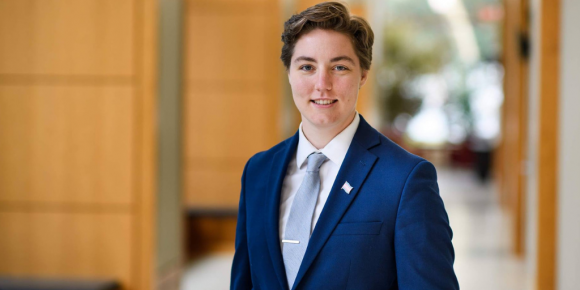
Mych Giansanti says he "was not chained to a desk doing legal research" and gained valuable hands-on experience this summer.
By pursuing a J.D. from Rutgers Law School, I envisioned I would have the ability and duty to advocate for marginalized individuals. This summer, I had the honor to advocate for those who could not afford private legal representation, as a Law Clerk for the Federal Public Defender’s Office in the District of New Jersey.
The Sixth Amendment to the United States Constitution grants accused individuals the right to representation in criminal prosecutions. The Criminal Justice Act (CJA), passed in 1964 and amended in 1970, enables the federal judicial districts to establish Federal Defender organizations to fulfill this Constitutional right. Federal Defender Offices are the institutional counterparts to U.S. Attorney’s Offices who prosecute federal crimes. The vast majority of people prosecuted in Federal court cannot afford the cost of representation. There is no criminal charge that overrides a person’s Constitutional right to legal representation. Clerking at the Federal Defender’s Office was an opportunity to serve both the individual and the public, by ensuring our criminal justice system is operating fairly.
The majority of the Office’s work involves making sure our clients are fairly sentenced such that justly compensates victims, maximizes rehabilitation, and keeps our communities safe. To that end, defenders work with investigators and support personnel to develop a complete picture of the client, examining their full history and current circumstances. Sometimes employers or family members write letters explaining their relationship with the client and speaking to their character. This information is compiled in a sentencing memo, along with the attorney’s recommendation to the judge about what the client’s sentence should be, within the range of sentencing guidelines judges use.
Writing sentencing memos for judges really drove home that clients are individual people with strengths and weaknesses, carrying trauma and triumphs, navigating life just like the rest of us. They have a Constitutional right to have their story heard, as judges can (and do) take facts separate from the charged crime into account at sentencing. I saw that many of our clients had childhood trauma, and could likely have benefited from advocacy in their past. This is one reason why I will be representing children in child abuse and neglect cases next semester in the Child and Family Advocacy Clinic at Rutgers; the legal system can be a tool to provide necessary services to those in need.
I observed clients who took charge of their lives by successfully “reentering” society after incarceration through the NJ Federal Prisoner Reentry Program. Each week, Prosecutors, Defenders, Parole Officers, client family members, and support staff met with specially selected participants in order to facilitate their successful transition to living in the community by removing or reducing barriers to securing stable housing, supporting their families, completing educational goals, and finding jobs. I highly value the unique experience of watching everyone working towards the common goal of supporting formerly incarcerated individuals and their communities, which is rare in our adversarial legal system. I was lucky to attend the graduation of a participant who had successfully completed 52 weeks of demanding program requirements. Although this client was no longer mandated to attend Reentry Court meetings, he enthusiastically said that he would keep attending nonetheless, because the support had been so helpful.
This mix of social work and law was what I envisioned when coming to law school. While earning my undergraduate degree in Developmental Psychology, I volunteered as a Court Appointed Special Advocate (CASA) for abused and neglected children in the Burlington County Family Court system. In this position, too, I saw the judge and attorneys on both sides trying to work together for the best interests of children. My role was to gather information about the child’s circumstances and needs, document and present them to the court, ensure that appropriate services were ordered, and explain the results of the proceeding to the child. CASA prepared me for reading Pre Sentencing Reports and advocating for clients’ needs this summer. Rutgers Law prepared me for researching and writing about obscure points of law and communicating case strategies with other attorneys.
I loved that my internship provided me a wide range of experiences that will serve me well in my legal career. I was not chained to a desk doing legal research (although I did get phenomenal research experience under the guidance of research and writing attorneys). Instead, I observed Federal criminal trials (including a bank robbery and a police officer’s prosecution for excessive force), sentencing hearings, hearings for violations of supervised release, met clients in state correctional facilities, toured a Federal Correctional Facility alongside interns from the US Attorney’s Office and Federal Law Clerks, and watched our client’s position argued before the United States Court of Appeals for the Third Circuit.
I deeply appreciate the Federal Judiciary in Camden, where judges, attorneys from both offices, and support staff have a passion for their work and facilitate a respectful and collegial environment. My commitment to public service has never been stronger. As a Social Justice Scholar at Rutgers Law entering my 3L year, I am excited to put the skills and knowledge I gained this summer to use through continued client advocacy.
